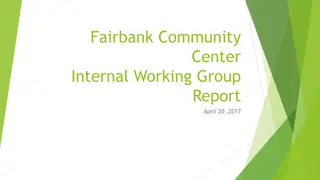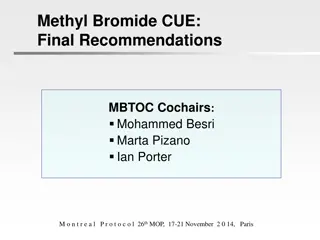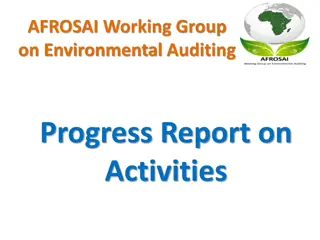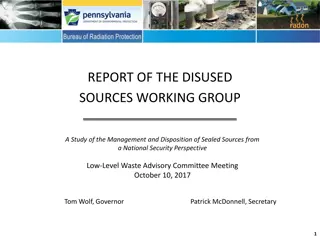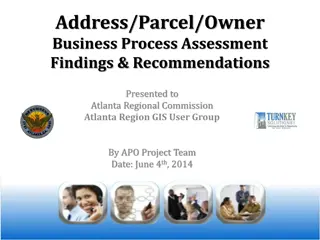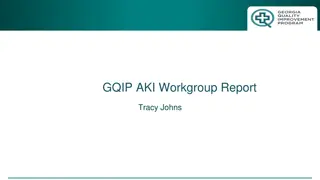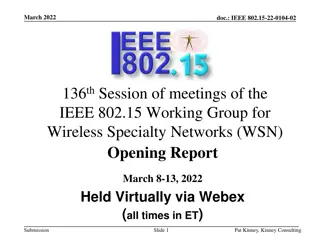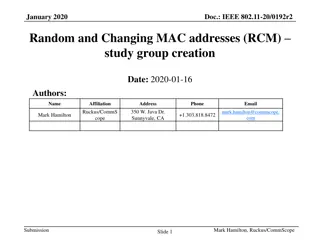
Working Group #1 Report and Recommendations
This document outlines the progress, future meetings, and recommendations of Working Group #1 related to topics such as recruitment, retention, training, and more. Recommendations include creating best practices for diversity, legislative amendments, demographic data collection, and coordination with relevant commissions.
Download Presentation

Please find below an Image/Link to download the presentation.
The content on the website is provided AS IS for your information and personal use only. It may not be sold, licensed, or shared on other websites without obtaining consent from the author. If you encounter any issues during the download, it is possible that the publisher has removed the file from their server.
You are allowed to download the files provided on this website for personal or commercial use, subject to the condition that they are used lawfully. All files are the property of their respective owners.
The content on the website is provided AS IS for your information and personal use only. It may not be sold, licensed, or shared on other websites without obtaining consent from the author.
E N D
Presentation Transcript
Working Group #1 PROGRESS REPORT and FUTURE MEETINGS Topics completed with recommendations submitted to full Task Force: Recruitment and Retention Training Topics remaining to be discussed by Working Group: 10/15 Civilian Oversight Boards Data Collection Psychological Evaluations Officer Involved Shootings entities responsible for investigation & prosecution No-knock warrant legislative changes 10/22 Body Cameras Asset Forfeiture Recommendations to Standards Commissions regarding decertification, data collection, and prevention of wandering officer issues 10/29 - finalization of recommendations for Accountability and Culture
Working Group #1 RECRUITMENT AND RETENTION RECS RECOMMENDATION 1 Creating a best practices document for recruitment and retention will help all agencies large and small understand how to achieve diversity, increase cultural awareness, and ensure that officers have emotional intelligence in order to better serve their communities. RECOMMENDATION 2 Recommend that the legislature amend N.C. Gen. Stat. 17C-20(5) to make every county eligible for the CJ Fellows Programs. Legislators should increase the allotted budget amount to reflect support for the administrative needs of the program as well as the additional eligible students. RECOMMENDATION 3 Each Commission should collect demographic data for those entering Basic Law Enforcement Training (BLET), those graduating BLET, and those currently certified by each Commission. RECOMMENDATION 4 The Task Force must coordinate with the two Commissions to ensure consistency between the two codes and that any additional recommendations made by the Task Force are placed before the Commissions for consideration. RECOMMENDATION 5 Support the ongoing work of the committee to create the North Carolina Law Enforcement Accreditation (NCLEA) program. RECOMMENDATION 6 Draft legislation to require the creation of diversity task forces in agencies larger than 25 employees.
Working Group #1 TRAINING RECS RECOMMENDATION 1 The Task Force will continue its relationship with the Justice Academy and make suggestions for changes to curriculum for BLET as well as all other aspects of training. The Task Force will recommend the creation of a new position at the Justice Academy to help focus on incorporating these ideas in existing trainings and creating new ones. RECOMMENDATION 2 The Task Force will work with the Joint In-Service Training (IST) Committee to suggest training topics for IST and to suggest additional mandatory training to be completed yearly. RECOMMENDATION 3 All agencies will have a culture that prioritizes emotional intelligence, respectful community interactions, and good mental health. Agencies will formalize these priorities through policy and procedure and train their employees regarding the consequences of violation of policy. RECOMMENDATION 4 Study the how the physical and mental wellness of officers affects their ability to perform job duties and make recommendations accordingly. RECOMMENDATION 5 Training programs must be studied and measured to ensure desired outcomes and guard against unintended consequences. Legislative funding is necessary to hire additional staff for the Justice Academy and outside consultants to develop these trainings, measure outcomes, and report back.
Working Group #1 RECRUITMENT AND RETENTION Changes and Information based on Survey Feedback Final Recommendation Text RECOMMENDATION 1 Creating a bestpractices document for recruitment and retention will help all agencies large and small understand how to achieve diversity, increase cultural awareness, and ensure that officers have emotional intelligence in order to better serve their communities. Feedback 1. Concern: Many officers can't afford to live in the communities where they work. Added the following sentence: Recognizing that not all officers are able to live in the communities they serve, agencies should prioritize educating their employees about the specific needs of their constituency. 2. Concern: Recommendation contains too much information. The implementation strategy is to select a group to actually draft the best practices document. This is a long-term goal and will require much collaboration.
Working Group #1 RECRUITMENT AND RETENTION Changes and Information based on Survey Feedback Final Recommendation Text RECOMMENDATION 3 Each Commission should collect demographic data for those entering Basic Law Enforcement Training (BLET), those graduating BLET, and those currently certified by each Commission. Feedback 1. Concern: This information is already collected by Commissions. Data collection is incomplete because it is not mandatory; the data cannot currently be disaggregated.
Working Group #1 RECRUITMENT AND RETENTION Changes and Information based on Survey Feedback Final Recommendation Text RECOMMENDATION 4 The Task Force must coordinate with the two Commissions to ensure consistency between the two codes and that any additional recommendations made by the Task Force are placed before the Commissions for consideration. Feedback 1. Concern: This is the province of the Commissions, not the Task Force. The Task Force may make recommendations to the Commissions, just like citizens. Amended Value-Oriented Future State to read: All justice officers will satisfy the same criteria with respect to minimum standards of employment and the decertification process, all requirements for data collection will be the same for both Commissions. Amended Implementation Strategy to include the word "recommend"
Working Group #1 RECRUITMENT AND RETENTION Changes and Information based on Survey Feedback Final Recommendation Text RECOMMENDATION 5 Support the ongoing work of the committee to create the North Carolina Law Enforcement Accreditation (NCLEA) program. Feedback 1. Concern: Department size may make compliance with accreditation standards difficult. Edited Solution to add sentence: Accreditation should be mandatory for all Law Enforcement Agencies in the state of North Carolina and establish a deadline by which all Law Enforcement Agencies must be accredited. Accreditation standards should make allowances for the feasibility of certain standards based on department size. 2. Concern: Making accreditation mandatory could cause problems for some agencies. NCLEA Committee Chair has indicated that he believes the Committee feels that every agency should meet the same set of basic standards and professionalism, and they are designing the accreditation criteria to meet that goal. 3. Other edits; Removed reference to SER since it has not yet passed Added "racial" to the types of diversity needed for the NCLEA Committee Clarified that recommendations would be submitted to Commissions for consideration
Working Group #1 RECRUITMENT AND RETENTION Changes and Information based on Survey Feedback Final Recommendation Text RECOMMENDATION 6 Draft legislation to require the creation of diversity task forces in agencies larger than 25 employees. Feedback 1. Concern: "Diversity Task Force" is not well defined, nor is there evidence it is needed. The Implementation Strategy states that the steps to accomplish this task include information gathering, seeking input from stakeholders, and creating a guide for agencies. 2. Concern: Funding will be needed for agencies to do this. Funding recommendations can be part of legislative solution. 3. Other edits; Made clear this applies to all agencies, not just police departments. Made clear that the task force will be composed of agency employees.
Working Group #1 TRAINING Changes and Information based on Survey Feedback Final Recommendation Text RECOMMENDATION 3 All agencies will have a culture that prioritizes emotional intelligence, respectful community interactions, and good mental health. Agencies will formalize these priorities through policy and procedure and train their employees regarding the consequences of violation of policy. Feedback 1. Concern: Measuring "culture" is hard to do. How will it be defined? The Implementation Strategy states this starts with a survey to determine what agencies are currently doing and then moves to working with the NCLEA Committee to try to flesh out details. 2. Concern: "All agencies" is too broad. The Task Force recognizes it is important to acknowledge that culture issues currently exist in law enforcement agencies. No agency should be excepted from the stated values in the recommendation.
Working Group #1 TRAINING Changes and Information based on Survey Feedback Final Recommendation Text RECOMMENDATION 4 Study the how the physical and mental wellness of officers affects their ability to perform job duties and make recommendations accordingly. Feedback 1. Concern: Who will undertake this study? The Implementation Strategy states the help of outside research agencies will be required. The Work Group did not undertake to survey the field of options, but this can be easily done in phase 2 of the Task Force. 2. Other edits: Made clear that changes would only be implemented if warranted based on the study.
Working Group #1 TRAINING Changes and Information based on Survey Feedback Final Recommendation Text RECOMMENDATION 5 Training programs must be studied and measured to ensure desired outcomes and guard against unintended consequences. Legislative funding is necessary to hire additional staff for the Justice Academy and outside consultants to develop these trainings, measure outcomes, and report back. Feedback 1. Concern: Recommendation needs to specify who or what will be funded. The Implementation Strategy states the funding is to hire additional staff at the Justice Academy to develop trainings for implicit bias, racial equity, and de-escalation. Further funding will be used for outside consultants with expertise in measuring outcomes. Edited Value-Oriented Future State to reiterate that the position would be at the JA JA Director Trevor Allen agrees with this addition to his staff 2. Concern: Study should focus on reduction of warrior culture and expansion of guardian culture. The study for each training will be different and will focus on what the stated desired outcomes are for that class. Those outcomes will be formulated during creation of the class.
Working Group #1 Discussion Questions 1.What do think about what has been presented? What were you really excited about? What is another recommendation that you might suggest (if any)? Is there anything from the idea bank that you feel needs to be considered for this recommendation?
Working Group #1 Discussion Questions 2. Do you think that these recommendations address racial disparities in the Criminal Justice system? If so, why? If no, why not?
Working Group #2 PROGRESS REPORT and FUTURE MEETINGS Topics completed with recommendations submitted to full Task Force: Use of Force (Partial) School Resource Officers Pre-Arrest Diversion Reinventing Public Safety/Reinvesting in Communities (Partial) Topics begun but recommendations not yet ready for full Task Force Community Policing Topics remaining to be discussed by Working Group: 10/12 Further discussion of Community Policing, Use of Force, and Reinventing Public Safety/Reinvesting in Communities 10/21 Criminal Investigations Drug Investigations 10/27 (may change) Criminal Investigations Traffic Enforcement 11/9 Clean Up/Any Remaining Issues/Finalize Recommendations
Working Group #2 USE OF FORCE RECS RECOMMENDATION 1 Data Collection: A statute should be enacted that requires law enforcement agencies to report to the State Bureau of Investigation (SBI) a standard set of information regarding uses of force by law enforcement officers. RECOMMENDATION 2 "Suicide by Cop": G.S. 15A-401(d)(2) should be revised to explicitly prohibit the use of deadly force when a reasonable officer would conclude that a person presents an imminent threat of death or serious physical injury only to themselves. Law enforcement agencies should revise their use of force policies to explicitly prohibit the use of deadly force when a reasonable officer would conclude that a person presents an imminent threat of death or serious physical injury only to themselves. RECOMMENDATION 3 Law enforcement agencies should revise their use of force policies to require an officer to alert his or her supervisor any time the officer points a gun at someone. RECOMMENDATION 4 Law enforcement agencies should revise their use of force policies to ban hog-tying subjects (defined as connecting a subject s hand and foot restraints behind the subject s back) and transporting them face down in a vehicle. RECOMMENDATION 5 Law enforcement agencies should adopt policies requiring all officers to have first aid kits and to call EMS and/or render immediate reasonable medical assistance to anyone in police custody who is injured or who complains of an injury. RECOMMENDATION 6 Law enforcement agencies should establish an early intervention system to identify and correct officers who use excessive force.
Working Group #2 SCHOOL RESOURCE OFFICER RECS RECOMMENDATION 1 Training for Schools and SROs: The Department of Public Instruction, in consultation with the Justice Academy, should develop and deliver training for all public school employees and SROs regarding the role and proper use of SROs. RECOMMENDATION 2 Data Collection: The Department of Public Instruction, in collaboration with the Department of Public Safety and local law enforcement agencies, shall collect data regarding exclusionary discipline in schools and school-based referrals to the juvenile courts. The data shall be published online at least annually and shall be searchable by school, by district, by student race, sex/gender, disability status, economic status, and grade, and by SRO involvement, all to the extent compatible with applicable confidentiality requirements. RECOMMENDATION 3 Alternatives for Addressing Behavioral Concerns: Schools should devote resources to hiring a sufficient number of nurses, counselors, psychologists, and social workers to meet the needs of students with behavioral difficulties. RECOMMENDATION 4 More School Justice Partnerships (SJP)s with Stronger MOUs. RECOMMENDATION 5 Develop Inclusive Processes for Selecting and Overseeing SROs: Law enforcement agencies that provide SROs, in collaboration with the communities they serve, should develop processes for selecting SROs that include input from schools and parents and that prioritize assigning officers who actively desire to serve as SROs. RECOMMENDATION 6 Support Task Force on Safer Schools State Action Plan: The recommendations in the State Action Plan for School Safety should be implemented. RECOMMENDATION 7 There should be funding for all school personnel to complete mental health, first aid, cultural competence/diversity/inclusion, and developmental disability training.
Working Group #2 REIMAGINING PUBLIC SAFETY RECS RECOMMENDATION 1 Communities should adopt strategies for responding to calls for service that involve mental illness, autism, intellectual disabilities, substance abuse, homelessness, and other non-emergency situations. These strategies should emphasize that law enforcement is not the best fit for every type of call for emergency services and instead we should focus on providing needed services and support. Approaches communities should consider include: a. Co-responder units pairing crisis-trained officers with social workers or other professionals; b. Models such as CAHOOTS (Eugene, Oregon) and STARS (Denver, Colorado) that provide for the dispatch of non- law-enforcement personnel to appropriate calls; c. At a minimum, the dispatching of officers with crisis intervention training, but ideally officers who specialize in crisis intervention. RECOMMENDATION 2 Crisis intervention training should be made a part of the curriculum for Basic Law Enforcement Training and should be provided to all current law enforcement officers.
Working Group #2 PREARREST DIVERSION RECS RECOMMENDATION 1 Local government entities, including city councils, county commissions, judicial/prosecutorial districts and school boards, in partnership with law enforcement agencies, service providers, and directly impacted people, should establish pre-arrest diversion programs throughout the state. The state should encourage and support these programs through appropriated and/or grant funding. Diversion efforts should build on current examples such as LEAD (Law Enforcement Assisted Diversion), the COORE program in Orange County, North Carolina, and the HOPE Initiative in Nashville, North Carolina. Recognizing that many of these programs have not historically benefited people of color, but that they are an upstream intervention that can prevent criminal justice involvement, those who design, implement, or fund such programs should insist that the programs emphasize racial equity in every aspect of the program and guard against the risk of racial inequity in a discretion-based program, including by: Prioritizing systematic data collection on race and ethnicity at all points of programming ; Comparing program demographics to county- or state-level demographics for people who are eligible for the program but not enrolled; and Including cultural competency training and education not just on substance misuse but also on racial equity and the overuse of the criminal justice system, the concept of collateral consequences of criminalization, and the effects of the racialized War on Drugs.2 Ensuring that these programs are provided at no cost to the participant.
Working Group #2 Changes and Information based on Survey Feedback All recommendations received overwhelming support Only minor/technical changes made based on comments from Task Force and other stakeholders
Working Group #2 Discussion Questions 1.What do think about what has been presented? What were you really excited about? What is another recommendation that you might suggest (if any)? Is there anything from the idea bank that you feel needs to be considered for this recommendation?
Working Group #2 Discussion Questions 2. Do you think that these recommendations address racial disparities in the Criminal Justice system? If so, why? If no, why not?
Working Group #3 RECS RECOMMENDATION 1 Legislation providing a sunset provision for all local ordinance crimes that criminalize poverty or behavior in public places RECOMMENDATION 2 Encourage law enforcement to issue citations in lieu of arrest whenever possible for misdemeanors. For Class III misdemeanors and violations of local ordinances, the process shall be the issuance of citations. Magistrates are encouraged to issue summons in lieu of arrest whenever possible, including for any civilian initiated charges. RECOMMENDATION 3 Encourage law enforcement and prosecutors to use diversion practices. RECOMMENDATION 4 Juvenile Justice
Working Group #3 CITY ORDINANCES Changes and Information based on Survey Feedback Final Recommendation Text Legislation providing a sunset provision for all local ordinance crimes that criminalize poverty or behavior in public places, e.g., disturbing the peace, begging, and public urination, and establishing guidelines for the creation of new ordinance crimes, particularly those that criminalize poverty, homelessness, and addiction. This legislation should have an explicit exception for ordinances that are issued under the emergency powers conferred in NCGS Chapter 166A. Local governments should undertake a review of their local ordinance crimes at least once every ten years. Feedback 1. Added emergency powers exception and narrowed scope
Working Group #3 CITATION IN LIEU OF ARREST Changes and Information based on Survey Feedback Final Recommendation Text Encourage law enforcement to issue citations in lieu of arrest whenever possible for misdemeanors. For Class III misdemeanors and violations of local ordinances, the process shall be the issuance of citations. Magistrates are encouraged to issue summons in lieu of arrest whenever possible, including for any civilian initiated charges. Feedback 1. Changed language to "encourage" 2. Data reporting and monitoring included in evaluation section
Working Group #3 DIVERSION Changes and Information based on Survey Feedback Final Recommendation Text Encourage law enforcement and prosecutors to work together to create diversion programs and expand access where appropriate. Wherever possible, do not exclude people because of their criminal history and consider the impact of collateral consequences of a criminal record during charging decisions. If a case should be dismissed outright, prosecutors should not route to diversion instead. We should fund and establish recovery courts and other programs to facilitate diversion. These programs should be of no cost to those who are indigent, and programs and treatment offered should be evidence-based. Feedback 1. Changed emphasis to underscore that diversion is not a law enforcement responsibility, and prosecutors play a central role 2. Added reference to recovery courts
Working Group #3 JUVENILE JUSTICE Final Recommendation Text Raise the minimum age of juvenile court jurisdiction to 12 years of age. Before a school-based petition initiated by a School Resource Officer (SRO) can be accepted for filing in juvenile court, a school administrator or school social worker must also sign the petition. Raise the age legislation mandates that any 16 or 17-year-old who is charged with an A-G felony be automatically transferred to the adult system upon a finding of probable cause or indictment. We propose a modification to allow prosecutors to have the discretion to accept pleas in juvenile court for juveniles charged with Class A through G felonies. This would allow 16 and 17 year-olds to remain in the juvenile justice system, where appropriate, and with consent of the district attorney.
Working Group #3 Discussion Questions 1.What do think about what has been presented? What were you really excited about? What is another recommendation that you might suggest (if any)? Is there anything from the idea bank that you feel needs to be considered for this recommendation?
Working Group #3 Discussion Questions 2. Do you think that these recommendations address racial disparities in the Criminal Justice system? If so, why? If no, why not?
Working Group #4 PROGRESS REPORT and FUTURE MEETINGS Topics Discussed with recommendations submitted to full Task Force for vote: Criminal Trials Racial Equity in Juries Increased Funding for Clemency Office/Parole Commission Topics to Be Presented by survey to full Task Force for comment: Fines & Fees Prison Discipline Topics remaining to be discussed by Working Group: 10/13 Prison Discipline infraction system Second Look Act Death Penalty 10/27 Collateral Consequences SNAP benefit eligibility, fair hiring in employment, review of SRCC recommendations 11/10 Review all pending proposed recommendations




